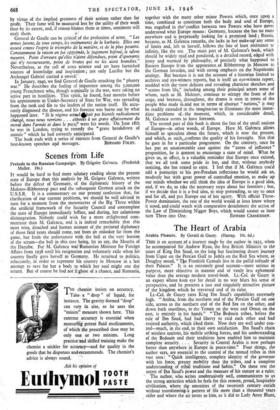Scenes frbm Life
Prelude to the Russian Campaign. By Grigoire Gafencu. (Frederick Muller. 18s.) Jr would be hard to find more salutary reading about the present state of Europe than this analysis by M. Grigore Gafencu, written before the defeat of Germany, of the diplomatic history of the Molotov-Ribbentrop pact and the subsequent German attack on the U.S.S.R. It is a commentary on our present confusion that, for clarification of our current problems, we should be well advised to turn for a moment from the manoeuvres of the Big Three within the artificial framework of the Security Council and contemplate the state of Europe immediately be and during, her calamitous disintegration. Nobody could wish for a more enlightened com- mentator than M. Gafencu, and it is indeed remarkable that this most wise, detached and human account of the perjured diplomacy of those fatal years should come, not from an onlooker far from the game, but froth the unfortunate with the ball at the very bottom of the scrum—the ball in this case being, let us say, the Mouths of the Danube. For M. Gafencu warRumanian Minister for Foreign Affairs from 1938 until his resignation and voluntariy exile when his country finally gave herself to Germany. He returned to politics, reluctantly, in order to represent his country in Moscow in a last attempt to save for her a body to -which her soul might one day return. But of course he had nor44host of a chance, and Rumania, together with the many other minor Powers which, once upon a time, combined to constitute both the body and soul of Europe, was engulfed in th?conflict between two Powers who have never understood what Europe means : Germany, because she has no roots anywhere and is perpetually looking for a promised land ; Russia, because, as M. Gafencu remarks, she lacks in her make-up any sense of limits and, left to herself, follows the line of least resistance to infinity, like the sea. The main part of M. Gafencu's book, which should be widely read and pondered, is a detailed record, edged with irony and warmed by philosophy, of precisely what happened to Eastern Europe from the appearance,of Ribbentrop in Moscow to the German invasion, and 'with strong emphasis on the Napoleonic analogy. But becaUse it is not the account of a historian limited to archives and eye-witness reports, but is itself an eye-witness report, studded with the .most delicate and revealing character sketches and " scenes from life," including among their principal actors some of whom, such as M. Molotov, continue to odcupy the front of the stage, and because, throughout, the drama is seen in terms of the people Who made it.and not in terms of abstract " nations," it may be readily extended in the imagination -to illuminate the most imme- diate problems of, the moment,- which, in considerable detail, M. Gafencu seems to have foreseen.
The second part of this book is about the fate of the small nations of Europe—in other words, of Europe. Here M. Gafencu allows himself to speculate, about the future, which is now the present, and which, as such,,confirms the quality of his foresight. Not that he goes in for a particular programme. On the contrary, once he has put an unanswerable • case against the " zones of influence" proposition, he is gontent to encourage a state of mind. What he gives us, in effect, is a valuable reminder that Europe• once existed, that we all took some pride in her, and that, without anybody noticing, she has ceased to • exist. I feel that if M. Gafincu cou'.d add a postscript to his pre-Potsdam reflections- he would ask us, modestly but with great power of controlled emotion, to make up our minds whether, we still think the idea of Europe is a good idea, and, if we do, to take the necessary steps about her frontiers ; but, if we decide that it is a-bad idea, to stop pretending, to say so once and for all, and put Europe out of her agony. With official Three- Power domination, the rest of the world would at least know where it stood, and could watch with comparative detachment the action of the Law of Diminishing Nigger Boys, which would sooner or later






























 Previous page
Previous page